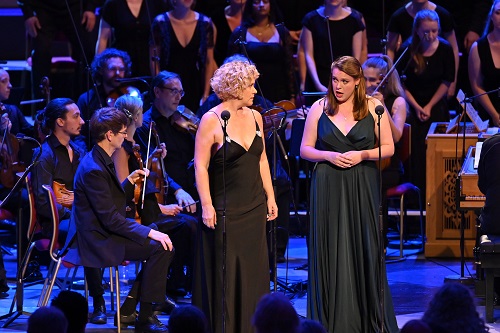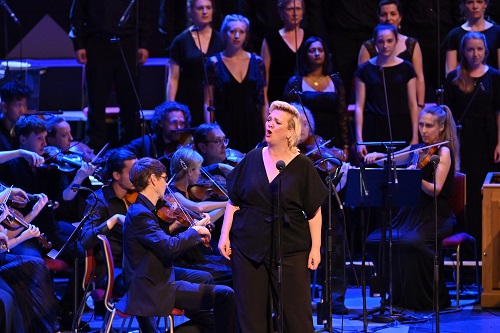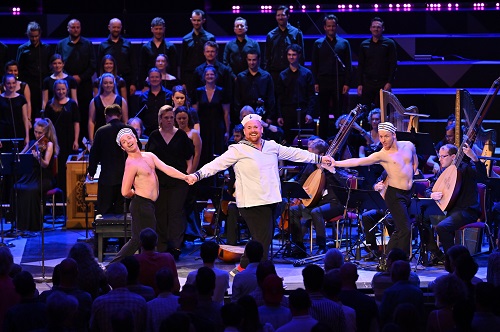We have no idea what the first performance of Purcell’s Dido and Aeneas sounded like, we’re not even sure when it took place. All we have are possibilities, probabilities, and a few certainties, plus manuscript material that dates from well after Purcell’s death. So conductors and soloists are free to create a performance in their own image. And whatever the circumstances of the opera’s first performance, it is highly unlikely to have taken place in a space as large as the Royal Albert Hall, so a Proms performance of the work is a time for further reassessment and imagination.
For the first late-night BBC Prom of the 2022 season, on Tuesday 19th July 2022, David Bates conducted La Nuova Musica in Purcell’s Dido and Aeneas with Alice Coote as Dido, James Newby as Aeneas, Gemma Summerfield as Belinda, Madeleine Shaw as the Sorceress, Nicky Spence as the Sailor, Tim Mead as the Spirit, Nardus Williams as the second woman, and Helen Charlston and Martha McLorinan as witches.
The last time I heard Dido and Aeneas, the accompaniment was provided by just seven instruments (HGO at the Cockpit). After all, Purcell’s score, as it survives, is not lavish in its instrumental requirements and very much adheres to the economic requirements of the London theatre of the time.
Faced with the open spaces of the Royal Albert Hall and a major dramatic voice in the title role, David Bates opted to go large. His orchestra featured 29 strings and a continuo group that consisted of two harps, four theorbos, two harpsichords, organ, two cellos and double bass. The choir was similarly large in scale.

This was a performance which challenged perceptions. There is no reason why Purcell’s opera should not be performed on this lavish scale, but the whole seemed to push the music towards a large-scale grandeur that, at times, felt closer to Berlioz than to the Purcell we know. The use of such a large continuo team, particularly with all those plucked instruments, rather recalled some more lavish performances of Monteverdi’s Orfeo, and seemed to entail Bates conducting some of the grander recitative passages rather than leaving them to soloist and a couple of instrumentalists.
But, from the ravishingly hushed sounds of the opening of the overture, it was clear that Bate’s view of the work was a highly interventionist one. Every single phrase, almost every note, was highly shaped, carefully articulated or vividly projected. He encouraged his performers to take great care with every detail, pulling, pushing, and shaping the music in a way which, for all the period sound world, felt closer to mid 20th-century Romantic performances of the opera.
This was an evening of extremely striking, and sometimes powerful moments, yet Bates seemed as interested in the connective tissue of the ritornellos and dances as the main arias and ensembles. The result was to rob the work of much of its cumulative drama; when the principals were not singing the dramatic focus was lost and we reverted to a world of gorgeous orchestral sound for its own sake.

In the Dido of Alice Coote, Bates clearly had a fellow sympathiser. Coote’s conception of the role, as projected here, was powerful and dramatic. Her way with the recitatives certainly carried in the Royal Albert Hall, but you felt that the intense detail of the originals was lost in the projection of a grander sound, Coote’s rich voice supported by four theorbos and two harps. Hers was a Dido that never, quite seemed happy, even in the second scene and at times you almost felt she resented Aeneas for the emotional disturbance that he caused. Her lament was wonderfully tragic, yet also truly idiosyncratic.
James Newby did what he could with the small role of Aeneas; certainly he made Aeneas’ recitatives count and his interactions with Coote’s Dido had an intriguing prickliness and sense of tension to them. Madeleine Shaw as the Sorceress avoided silly voices and mannerisms, she simply gave us fine drama – large-scale, to fit the conventions of this performance, but finely calibrated and forming a strong backbone to the work.
Gemma Summerfield’s Belinda gave me some of the most treasured moments in the opera. She fitted in with the large-scale ethos of the performance yet performed Purcell’s music with a touching naturalism and simplicity. Her solo at the opening of the second scene of Act Two was a moment of simplicity and beauty. Nardus Williams seemed woefully underused as the Second Woman, and her solo was somewhat overshadowed by the richness of the orchestral accompaniment.

Tim Mead’s guest appearance as the Spirit, singing from the organ balcony, was a striking moment indeed. Nicky Spence’s appearance as the Sailor along with two shirtless dancers seemed, no matter how finely sung this was, to veer rather alarmingly towards send-up with the trio’s relentless comic hornpipe. Though, it has to be admitted, that this moment was popular with the audience.
Helen Charlston and Martha McLorinan stepped out of the choir to sing a pair of musical witches, finely supporting Madeleine Shaw. The large chorus was in terrific voice and did everything that Bates required of them to striking effect, even though this took the music away from the emotional directness that Purcell brings to this.
This was a highly shaped, highly articulated performance, a musical tour de force that filled the hall with gorgeous sounds but ultimately it was a performance that failed to move me and seemed to not quite articulate the drama, instead we had a series of stunning moments.
It has to be admitted that I was in a minority and the audience in the Royal Albert Hall responded strongly and enthusiastically.
Robert Hugill
Henry Purcell: Dido and Aeneas
Dido – Alice Coote, Aeneas – James Newby, Sorceress – Madeleine Shaw, Belinda – Gemma Summerfield, Second Woman – Nardus Williams, Spirit – Tim Mead, Sailor – Nicky Spence, Witches – Helen Charlston, Martha McLorinan, Dancers – Luke Cartwright, Owen Morris, La Nuova Musica, Conductor – David Bates
Royal Albert Hall, London; Tuesday 19th July 2022.
ABOVE: Prom 7, Dido and Aeneas (c) Christopher Christodoulou